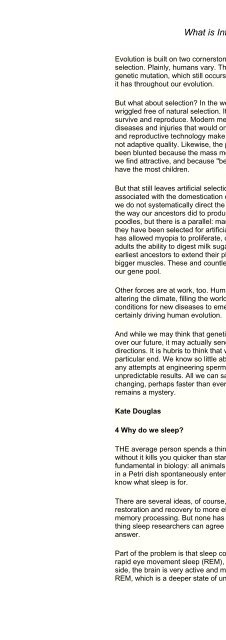07.+What+is+Intelligence+(February+2006) - Get a Free Blog
07.+What+is+Intelligence+(February+2006) - Get a Free Blog
07.+What+is+Intelligence+(February+2006) - Get a Free Blog
You also want an ePaper? Increase the reach of your titles
YUMPU automatically turns print PDFs into web optimized ePapers that Google loves.
What is Intelligence? 128<br />
Evolution is built on two cornerstones: heritable variation and<br />
selection. Plainly, humans vary. The source of that variation is<br />
genetic mutation, which still occurs at around the same rate today as<br />
it has throughout our evolution.<br />
But what about selection? In the west we certainly seem to have<br />
wriggled free of natural selection. It is no longer just the fittest who<br />
survive and reproduce. Modern medicine allows people to overcome<br />
diseases and injuries that would once have killed them. Birth control<br />
and reproductive technology make reproduction a matter of choice,<br />
not adaptive quality. Likewise, the power of sexual selection has<br />
been blunted because the mass media has a strong influence on who<br />
we find attractive, and because "beautiful" people do not necessarily<br />
have the most children.<br />
But that still leaves artificial selection, the force more usually<br />
associated with the domestication of animals and plants. Obviously,<br />
we do not systematically direct the evolution of our own genome in<br />
the way our ancestors did to produce high-yield wheat or miniature<br />
poodles, but there is a parallel: many human traits only exist because<br />
they have been selected for artificially. The invention of spectacles<br />
has allowed myopia to proliferate, dairy farming has given many<br />
adults the ability to digest milk sugar, and stone tools allowed our<br />
earliest ancestors to extend their physical abilities without evolving<br />
bigger muscles. These and countless other innovations have affected<br />
our gene pool.<br />
Other forces are at work, too. Humans are changing the environment,<br />
altering the climate, filling the world with pollution and creating the<br />
conditions for new diseases to emerge - changes that are almost<br />
certainly driving human evolution.<br />
And while we may think that genetic technology will give us control<br />
over our future, it may actually send human evolution in unexpected<br />
directions. It is hubris to think that we can engineer our genome to a<br />
particular end. We know so little about how our genes interact that<br />
any attempts at engineering sperm or eggs may well have<br />
unpredictable results. All we can say for sure is that our gene pool is<br />
changing, perhaps faster than ever. But where evolution will take us<br />
remains a mystery.<br />
Kate Douglas<br />
4 Why do we sleep?<br />
THE average person spends a third of their life asleep, and going<br />
without it kills you quicker than starvation. Sleep seems to be<br />
fundamental in biology: all animals do it, and even cultured neurons<br />
in a Petri dish spontaneously enter a sleep-like state. Yet we don't<br />
know what sleep is for.<br />
There are several ideas, of course, ranging from obvious ones about<br />
restoration and recovery to more elaborate theories dealing with<br />
memory processing. But none has been confirmed, and the only<br />
thing sleep researchers can agree on is that there is no satisfactory<br />
answer.<br />
Part of the problem is that sleep comprises two very different states:<br />
rapid eye movement sleep (REM), when the eyes flick from side to<br />
side, the brain is very active and most dreaming occurs, and non-<br />
REM, which is a deeper state of unconsciousness. These are so


